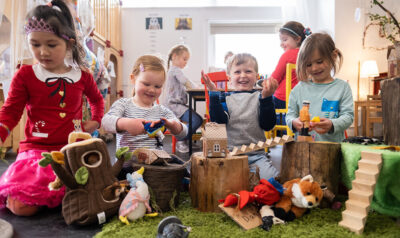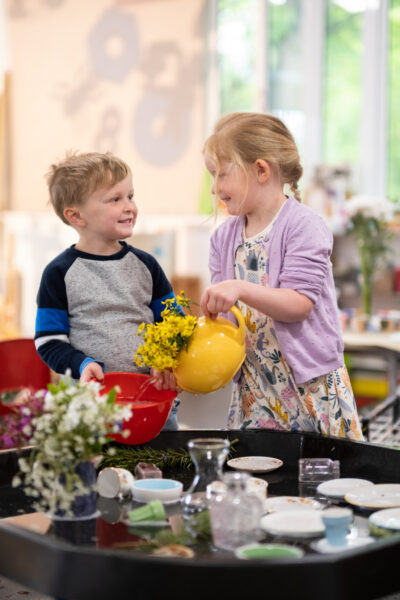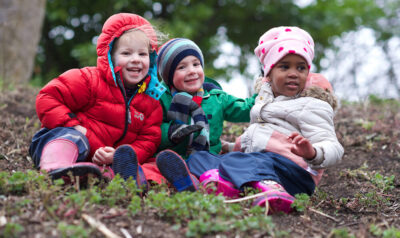Latest

Inside St George's Nursery: A Holistic Approach to Early Education

- Discover the innovative vision and curriculum that sets St George's Nursery apart, nurturing curiosity, creativity, and a strong sense of community.
- Uncover how the nursery fosters emotional intelligence and well-being through mindfulness practices and engaging tools like the "Colour Monster" story.
- Learn how the nursery measures success through family feedback, inspection reports, and tracking personal and academic progress beyond the nursery years.
- Explore the nursery's hands-on approach to teaching sustainability, from recycling projects to outdoor learning experiences that connect children with nature.
- Find out how the nursery's collaborations with organizations like the Royal Scottish National Orchestra and National Art Galleries enrich learning experiences and benefit the community.
Read the full feature article below:
What is the vision for education that underpins the work in the nursery?

Our vision is to provide a secure, caring, and stimulating environment that lays the foundation for every child to have a joyful start to their education. For the nursery years, we know this is about creating opportunities for quality playtime, developing secure relationships, and supporting natural curiosities. This thinking is at the heart of the environment created by our staff in the nursery.
We know that the quality of relationships and trust can make or break a child’s experience of schooling. Our Early Years Team place a priority on getting to know each individual child and their family, and through that relationship are able to build upon early interests shown by the children to develop their interests, build their confidence and foster their developing skills. In this way, the children, and their families, are given the best possible start to their education, no matter what setting or experiences they have had before joining us.
Our mission is encapsulated within philosophies – the 'Three C's' - Curiosity, Creativity, and Community -- that emphasize creating warm, nurturing spaces that reflect the child's home environment, allowing them to learn through child-led activities, purposeful play, problem-solving, creativity, and role-play. An everyday example of this is when our pre-school children created their own cosy ‘nests’ in their ‘loft’ play area using natural materials, following bird-watching activities in our Fantastical Forest. These are our . We foster a family feel, guided by the principles of the Curiosity Approach, Hygge in the Early Years, 'Slow Pedagogy' by Alison Clark, and Froebelian principles.
How do we know that our setting has been successful, and how do we objectively measure this success?
Success is measured via feedback from families; objective inspection reports; and tracking of personal and academic progress beyond the nursery years.
The Nursery continuously tracks the children’s knowledge, skills, social, and emotional development, celebrating and sharing their growth through Learning Journals and parent meetings. By the end of Primary 2 over 50% of our pupils are scoring over the average in their developed ability scores (comprising reading, general maths and arithmetic). Whilst it is hard to link standardised test scores to a good start in Nursery, students that begin with us in Nursery invariably have excellent ‘approach to learning’ scores all the way through to Upper 6th.
Strengths noted in our 2022 Care Inspectorate report were:
- “Communication within the nursery was a key strength. [Parents] felt that information sharing at the end of the day provided a very good snapshot of their child's day.”
- Children were happy, having fun and confident in their surroundings.
- Children had opportunities to influence their play and learning.
Feedback on nursery review sites reflects this, for example:
“Our daughter…was literally running into the nursery after a few days. The staff are so kind and caring. She has developed so much in the few months she's been there and is very happy. We'd highly recommend!"
"By far the best experience we have had at a nursery to date. The staff here are extremely nurturing, loving, kind, and very empathetic. They celebrate each child's diversities and strengths. My daughter has grown immensely since the beginning."
What makes St George’s Nursery stand out from other nursery schools?

St George's Nursery stands out for its innovative curriculum, superb relationships, community engagement, and commitment to holistic education.
We particularly focus upon fostering curiosity in the curriculum through STEM. Our children delve into coding using robots and interactive games, setting the foundation for logical thinking, problem-solving, and creativity. Given the under-representation of girls and women in STEM careers, we dispel stereotypes from an early age using positive role models and role play. One successful example of this has been our partnership with the National Art Galleries, with our staff and children helping to pilot the innovative "Maths in Motion" resource, which uses inter-disciplinary learning to introduce the children to mathematical concepts: maths-in-motion-slide-show-early-level.pptx (live.com) The outcome has been evident in the positive attitude of the children towards problem solving, experimentation and pattern-spotting.
An example of our holistic approach is the way we have embraced mindfulness and emotional well-being, utilising engaging tools such as the "Colour Monster" story, characters from "Inside Out", yoga, and mindfulness activities. Children explore a spectrum of emotions, learning valuable strategies to cope with difficult emotions, which fosters emotional intelligence that extends beyond the classroom. Techniques that have had an impact on the children is pretending to blow dandelions to practice calming breaths.
We provide a holistic and dynamic learning experience that nurtures academic growth, emotional intelligence, and a sense of community, preparing our children for the challenges and opportunities of the future.
What impact does our projects and initiatives have on the quality of learning?
We continue to refine our observation and assessment processes, following the Anna Ephgrave 'Planning in the Moment' approach. Regular moderation and sharing of good practices ensures meaningful feedback to parents which enables families to support learning at Nursery. Examples of this include families adapting their parenting skills to incorporate the ‘golden rules’, such as ‘kind hands’ or ‘walking feet’. Following a learning topic on ‘Time’ in the pre-school group, children brought in watches to apply what they had learnt. Our practitioners also pick up on the interests of a child; a child with an interest in slugs was encouraged to develop this curiosity with books about invertebrates.
Another project that positively impacts learning quality is the development of our outdoor provision. We continually reviewed each area and, by incorporating observations from Dr Clare Warden's virtual nature school, we enrich the children’s learning experiences. It is common to see the children making ‘chocolate pies’ or ‘worm spaghetti’ in our mud kitchens, nurturing a healthy respect for nature.
Our Nursery has worked closely with the Royal Scottish National Orchestra to bring intergenerational social events to the residents of Murrayfield Care Home. Children played balloon catch with residents, focusing on motor skills for both. Our children also chatted to the residents whilst an RSNO opera singer sang to create a sensory experience for all. This collaboration has been in place since 2017 and is just one example of projects which benefit the community and help our children to develop their social and communication skills.
How are we engaging children in learning about sustainability?

We use hands-on projects, outdoor learning, and everyday practices. Our annual paper recycling project is a prime example. Children learn about the origins of paper, the impact of deforestation, and the importance of recycling. They explore actionable solutions and present their findings and handmade paper to our Junior School children, spreading awareness and inspiring others to join in sustainable practices.
Through outdoor learning children engage with the natural world: projects include discovering the sky, climbing trees and science stories about Earth and other planets. These experiences foster a connection with nature and deeper understanding of their role in its preservation. A recent response from a preschool student, Isabella, was: “Taking care of the trees will make our earth smile.”
We focus on reducing waste by recycling and reusing items in play, craft, and sensory experiences. We source materials from charity shops and provide natural objects for children to incorporate into their play.
We encourage children to be global citizens and bring attention to world events in an age-appropriate way. For example, in 2019, we worked with our families to raise awareness about Australian forest fires. The children learned about the impact of global warming, developed a slogan, made posters, and sold glass raindrops.
In collaboration with our school catering team, we teach children about healthy eating habits and reducing food waste, fostering a positive mindset that continues as they move through the school and helping them to understand how they can contribute to a sustainable future.


